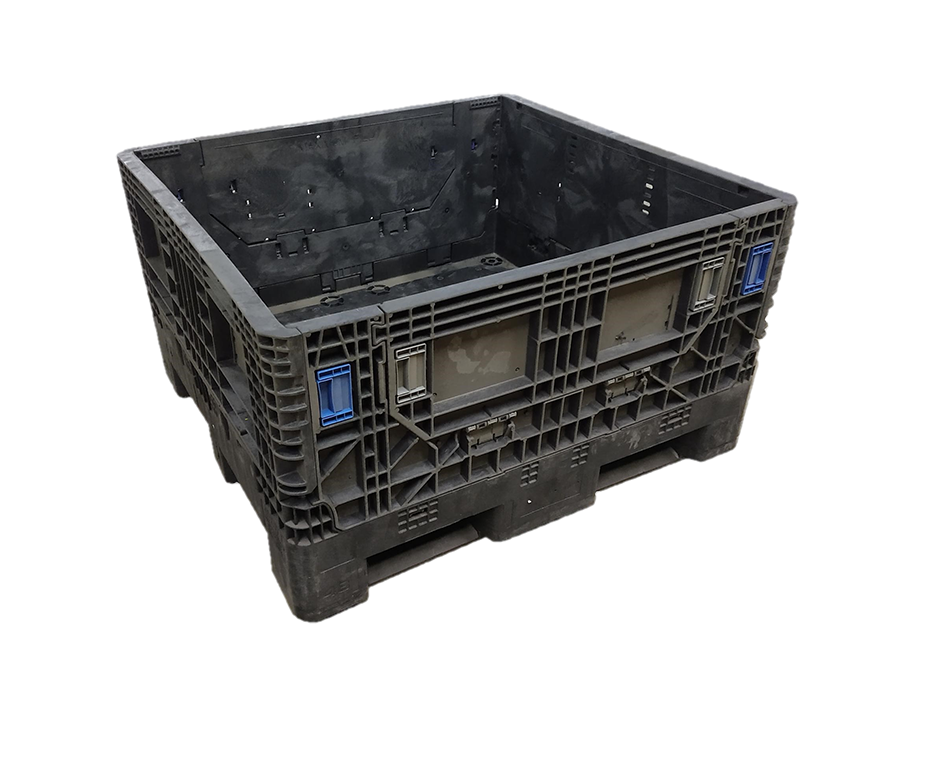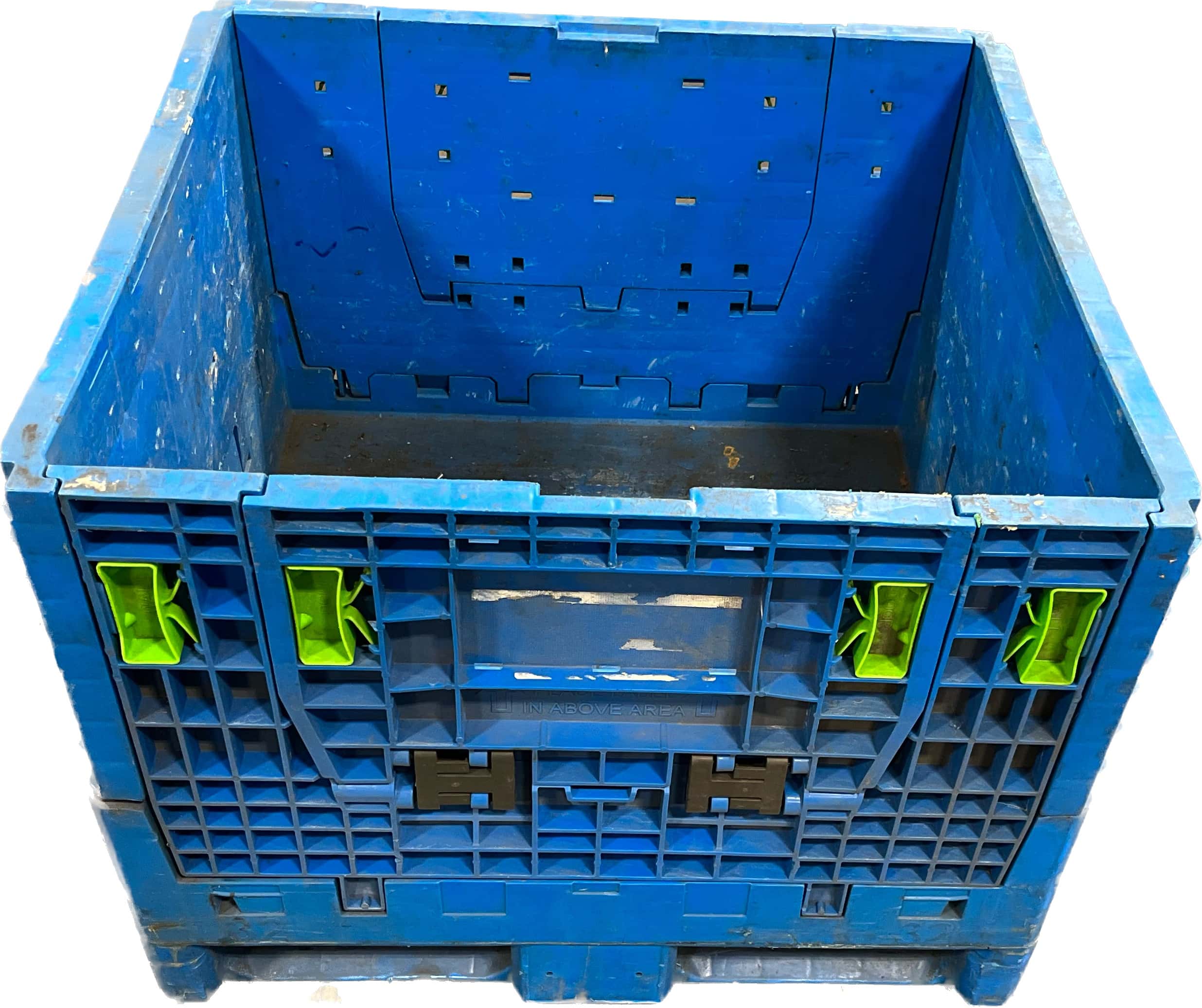Used collapsible containers as versatile options for smart storage systems
Wiki Article
The Ultimate Overview to Selecting the Right Mass Containers for Your Business Demands
Choosing the suitable bulk containers is essential for any company that relies upon effective logistics. Various kinds of containers exist, each developed for details products and applications. Aspects such as dimension, product compatibility, and governing criteria play a significant role in this decision-making procedure. Recognizing these elements can result in enhanced operational effectiveness. Lots of businesses neglect crucial aspects that might boost their general performance and sustainability. What are these factors to consider?Comprehending Various Kinds of Mass Containers
Mass containers function as necessary tools for companies seeking effective storage and transport solutions. These containers come in various kinds, each created to meet particular functional requirements. One common type is the intermediate bulk container (IBC), which is ideal for granulated and liquid products, using a balance of ability and maneuverability. One more popular choice is the mass bag, or FIBC, appropriate for completely dry, flowable items. These flexible containers are light-weight and can be quickly delivered and stored. For larger materials, inflexible bulk containers are typically utilized, giving durability and stability for safe handling. In addition, there are specific containers customized for hazardous products, ensuring conformity with safety laws. Recognizing the distinct features of these mass container types allows services to make enlightened decisions that enhance logistics and reduce costs. By picking the ideal container, firms can enhance their operational effectiveness and simplify their supply chain processes.Trick Product Considerations for Bulk Containers
When choosing bulk containers, it is vital to contemplate the materials used in their construction. Elements such as sturdiness, chemical, and strength compatibility play an essential function in ensuring the containers meet specific functional needs. Furthermore, weight and transportability issues can affect both efficiency and transport logistics.Material Longevity and Stamina
Resilience and stamina are crucial variables in picking materials for bulk containers, as they straight affect the container's capacity to stand up to various environmental problems and taking care of processes. Materials such as high-density polyethylene (HDPE), polypropylene, and stainless-steel are commonly favored for their durable properties, using resistance to abrasion, impact, and temperature variations. The selection of product also affects the general life-span of the container; stronger materials normally lead to less constant substitutes, leading to cost savings gradually. Additionally, the weight of the product can influence delivery costs and convenience of handling. Services have to consider their specific functional atmospheres and the possibility for wear and tear to ensure peak sturdiness and stamina in their mass container option.Chemical Compatibility Factors
Understanding chemical compatibility is necessary for choosing bulk containers, as the materials used must resist the specific substances they will certainly hold. Different variables affect compatibility, including the chemical nature of the materials, temperature level, and duration of storage space. For example, corrosive chemicals may require containers made from stainless steel or specialized plastics that resist deterioration. Furthermore, reactive compounds can create heat or gases, requiring vented or pressure-rated containers. The choice of container product, whether polyethylene, metal, or polycarbonate, must line up with the chemical residential properties of the kept substances to stop leaks or breaches. Eventually, a thorough evaluation of these compatibility variables ensures risk-free handling and storage, shielding both personnel and the setting while maintaining item honesty.Weight and Mobility Problems
Selecting bulk containers involves not only examining chemical compatibility yet additionally considering weight and mobility. Companies should examine the ease of handling and transportation to optimize efficiency. Lightweight products like high-density polyethylene (HDPE) or light weight aluminum can promote less complicated activity and reduce shipping costs. On the other hand, heavier containers may provide boosted longevity but can impede flexibility, especially in settings calling for frequent relocation. Additionally, the design of the container ought to enable practical training and stacking, guaranteeing ergonomic security for workers. Firms ought to also think about the framework available for transportation; for instance, containers suitable with forklifts or pallet jacks can enhance operations. Inevitably, the right equilibrium in between weight and transportability straight influences operational efficiency and cost efficiency.Sizing Your Bulk Containers for Ideal Efficiency
When sizing bulk containers, businesses need to meticulously evaluate the dimensions required to accommodate their details items. Furthermore, weight capability is a crucial aspect that influences performance and safety and security throughout transport and storage. Effective sizing not only makes best use of room however additionally maximizes operational workflows.Determining Container Dimensions
Picking the right dimensions for bulk containers is vital for taking full advantage of performance in storage space and transportation. Services should assess their certain needs, considering variables such as readily available area, the nature of the items being saved, and the approaches of transport utilized. Exact measurements guarantee that containers fit preferably in storehouses and vehicles, lessening squandered space and decreasing taking care of time. Standard dimensions can provide ease, but custom measurements could be needed for special demands or to accommodate certain items. Furthermore, it is necessary to review piling capabilities and access, as these factors affect general operational performance. Eventually, the best measurements cause enhanced organization and structured logistics, benefiting the overall performance of business.Weight Capacity Considerations
Recognizing weight capacity is vital for services intending to enhance their bulk container efficiency. The weight capacity of a container directly influences storage capacities, transport logistics, and total functional expenses. Picking containers with the ideal weight more info limits guarantees that services can safely save and deliver their goods without risking damage or conformity issues. Overloading containers can result in architectural failures, while underutilizing capacity results in squandered resources. It is necessary for businesses to evaluate their item weights and consider any type of governing requirements when selecting containers. Additionally, aspects such as the type of product, meant usage, and environmental conditions must additionally affect weight capacity decisions. By examining these elements, companies can boost efficiency and guarantee a structured supply chain.Governing Compliance and Security Standards

Regulatory compliance and security standards play a necessary role in the choice of mass containers for companies. Organizations should assure that their containers meet different policies established by local, nationwide, and worldwide authorities. These criteria frequently relate to product security, structural stability, and appropriate labeling, which assist protect against crashes and assure the risk-free transportation of products.
In addition, adherence to industry-specific guidelines, such as those from the Food and Drug Administration (FDA) or the Occupational Safety And Security and Health Administration (OSHA), is critical for companies taking care of unsafe products or foodstuff. Non-compliance can result in penalties, lawful concerns, or damages to a business's reputation.
Companies must additionally think about the container's compatibility with the materials being stored or carried to stay clear of contamination or chemical reactions (used collapsible bulk containers). To sum up, understanding and executing governing conformity and safety and security standards is necessary for the effective and liable use bulk containers
Sustainability Alternatives for Eco-Friendly Mass Containers

Firms are likewise checking out choices made from recycled materials, which not just preserve sources but also support the recycling industry. Technologies in layout enable for lighter containers that need much less energy to transport, additionally improving sustainability. By integrating these eco-friendly mass container options, companies can demonstrate their dedication to ecological stewardship while satisfying customer need for sustainable practices. This shift not just aids the planet yet can likewise improve brand name credibility and client loyalty.
Cost-Effectiveness and Budgeting for Bulk Containers
While many organizations concentrate on sustainability, cost-effectiveness stays an important factor when picking bulk containers. Organizations should analyze the initial acquisition price, as well as long-lasting operational prices, to ensure financial practicality. Aspects such as sturdiness, maintenance, and reusability play a considerable role in determining overall costs.Purchasing premium containers may yield greater in advance costs yet can result in savings via lowered substitute prices and reduced waste. Additionally, organizations ought to think about transportation costs and storage space effectiveness, as these can influence the total spending plan.

Often Asked Questions
Just how Do I Establish the Right Container for Hazardous Products?
To establish the right container for unsafe products, one must assess compatibility with the material, take into consideration the container's product, check for regulatory compliance, and evaluate ability and security attributes to assure appropriate handling and storage space.Can Bulk Containers Be Personalized for Details Products?
Yes, bulk containers can be personalized for specific products. used bulk containers. Different features, such as layout, dimension, and material, can be tailored to fulfill one-of-a-kind demands, making sure optimal security and effectiveness for carrying and storing different productsWhat Is the Average Life-span of Various Mass Container Types?
The ordinary life-span of mass container kinds differs; plastic containers last 5-10 years, steel containers 10-20 years, and wood containers typically last 3-7 years, depending upon usage, upkeep, and environmental conditions.Just how Should I Tidy and Maintain Mass Containers?
To cleanse and preserve bulk containers, one need to regularly evaluate for damage, eliminate residue, wash with suitable cleaning agents, rinse completely, and guarantee appropriate drying before storage. Adhering to producer standards enhances longevity and safety and security during usage.Are There Rental Choices for Mass Containers Available?
Yes, countless business use rental choices for mass containers, providing flexibility for businesses. These leasings can accommodate numerous needs, allowing business to take care of stock effectively without the dedication of buying containers outright.Toughness and strength are crucial aspects in picking materials for bulk containers, as they straight influence the container's ability to stand up to different environmental problems and taking care of processes. Understanding chemical compatibility is essential for selecting mass containers, as the products used must withstand the details materials they will hold. Recognizing weight ability is vital for businesses aiming to optimize their mass container efficiency. Regulative compliance and security standards play an important function in the selection of mass containers for organizations. While lots of organizations concentrate on sustainability, cost-effectiveness continues to be an important aspect when choosing bulk containers.
Report this wiki page